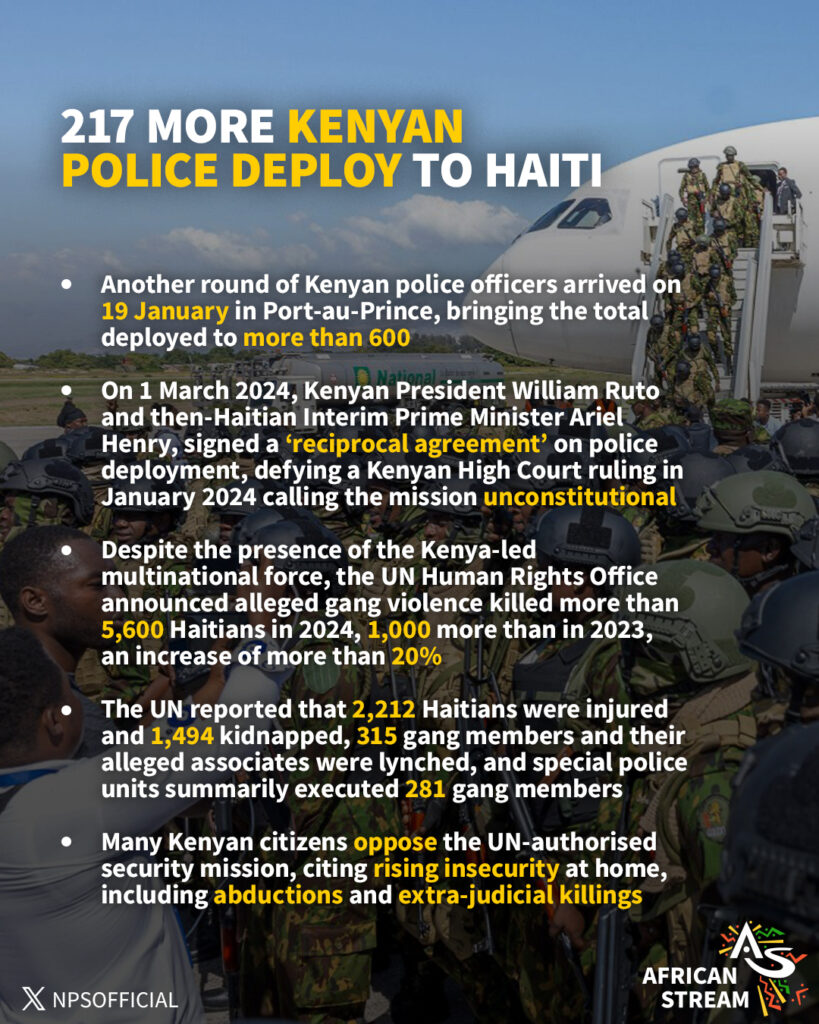On 19 January, 217 Kenyan police officers arrived in Haiti, increasing the number of Kenyan personnel deployed to the Caribbean country to over 600. This comes despite the mission—launched with the US promising $200 million—being chronically underfunded, leading to paycheck delays for officers, some of whom have reportedly abandoned their posts.

An additional 400 officers are expected to deploy in the future, fulfilling Kenyan President William Ruto’s commitment to send 1,000 officers to assist in addressing alleged escalating gang violence in Haiti. This deployment follows a UN human rights report showing a 20 per cent rise in gang-related homicides despite the presence of the Kenya-led multinational security force. Alleged gang violence k*lled over 5,600 Haitians in 2024, with more than 2,000 injured and nearly 1,500 kidnapped.
Some sources say the Haitian bourgeoisie funds gang vi*lence.
In January 2024, the Kenyan High Court ruled the mission unconstitutional. Nevertheless, on 1 March 2024, Ruto and then-Haitian Interim Prime Minister Ariel Henry signed a ‘reciprocal agreement’ that authorised the deployment.
Critics have cited the historical interference of the US, France, Britain and Canada in Haiti’s affairs since it ousted French enslavers, becoming the first Black republic in 1804. Past peacekeeping efforts in Haiti have resulted in more harm than good. For instance, a cholera outbreak in 2010, linked to UN Nepalese peacekeepers, led to the deaths of up to 30,000 Haitians after they contaminated the Artibonite River.
After winning independence, Haiti fought to maintain its sovereignty against foreign interference. In 1825, France imposed a staggering indemnity of 150 million francs ($90 million in unadjusted terms) on Haiti as compensation for the loss of the colony. This payment hindered the country’s development. (For perspective, the US acquired France’s Louisiana Territory in 1803 for just $15 million.)
Additionally, from 1915 to 1934, the US invaded and occupied Haiti. Then it backed the overthrow of democratically-elected Haitian president, Jean-Bertrand Aristide, in 1991 and again in 2004.
Kenyans opposed to deployment have remarked on their country’s insecurity problem with bandits, abductions and alleged extrajudicial k*llings. Given that, how can the East African state succeed in pacifying Haiti?
Sources;
https://www.bbc.com/news/world-africa-68090488
https://www.theguardian.com/world/2024/mar/01/haiti-police-officers
https://news.un.org/en/story/2025/01/1158781
https://www.nationalpolice.go.ke/arrival-third-contingent-kenyan-police-officers-haiti-mission
https://www.history.navy.mil/research/library/online-reading-room/title-list-alphabetically/u/us-occupation-of-haiti-1915-1934.html
https://www.nationalgeographic.com/history/article/louisiana-purchase-bargain-came-great-human-cost
https://responsiblestatecraft.org/us-haiti-coup
https://marxist.com/the-gangs-of-haiti-and-the-failure-of-bourgeois-rule.htm
https://edition.cnn.com/2024/08/26/americas/kenyan-police-haiti-delayed-pay-intl-latam/index.html
